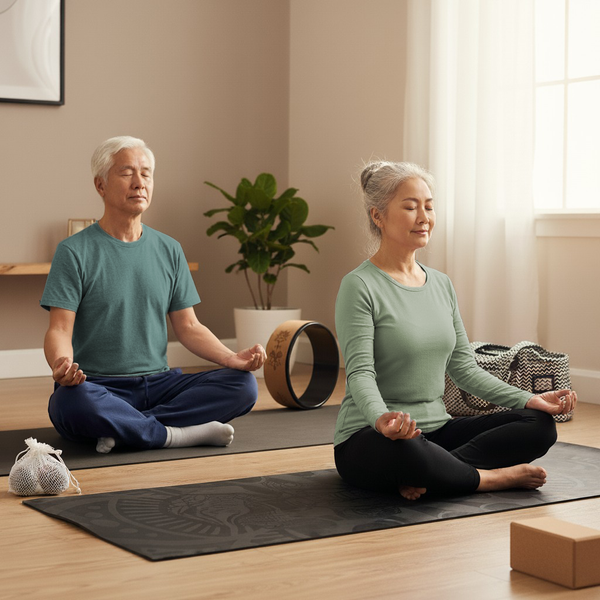Yoga, Brain Aging & Alzheimer’s Risk: What a 12-Minute Practice Can - and Can’t - Do
A small but credible stack of randomized trials shows a short daily Kundalini practice (Kirtan Kriya) can help people feel more mentally steady and can nudge stress–inflammation biology in a healthier direction. It does not prevent or cure Alzheimer’s. It’s a practical, low-risk habit that fits into a traditional wellness routine and it takes less time than scrolling your feed.
What the best recent study actually did
In 2024, UCLA researchers randomized postmenopausal women with memory concerns and cardiometabolic risk to either Kundalini Yoga (weekly 60-min class plus a 12-min daily Kirtan Kriya) or Memory Enhancement Training for 12 weeks, with follow-up at 24 weeks.
What moved: the yoga group reported less “seriousness of forgetting” and showed anti-inflammatory gene-expression shifts in blood cells (including interferon-γ-related signatures). A blood marker linked to aging (eotaxin-1) rose in the memory-training group but not in the yoga group.
What didn’t: some objective memory scores didn’t favor yoga; one delayed-recall measure dipped in the yoga arm at 24 weeks. Translation: people felt sharper and their biology tilted the right way, but not every lab measure moved.
Bottom line: promising signals in symptoms and immune biology. Worth doing; not magic.
What the brain scans suggest
Two companion RCT MRI papers help explain the “why”:
Gray-matter protection (12 weeks): yoga prevented cortical gray-matter atrophy seen in the memory-training group (small MRI subsample, across prefrontal, parietal, temporal areas).
Hippocampal connectivity: yoga increased left anterior hippocampal connectivity with networks tied to lower stress; memory training boosted connections tied to memory reliability. Different tools, different strengths. Together, they’re complementary.
Earlier work in mild cognitive impairment (MCI) found both yoga and memory training helped memory, but only yoga improved executive function and mood, with benefits lasting to 24 weeks.
The stress–inflammation angle (why this might matter)
Chronic stress pushes pro-inflammatory signaling that tracks with biological aging. In family dementia caregivers, 8 weeks of 12-min/day Kirtan Kriya shifted immune gene activity away from NF-κB (pro-inflammatory) and toward IRF-1 (antiviral/immune-regulating)—the molecular opposite of stress. The 2024 trial above echoed this “anti-inflammatory tilt.”
There’s also preliminary imaging showing increased cerebral blood flow in frontal and parietal attention/memory regions after Kirtan Kriya in people with memory loss. Small samples, but consistent direction.
Who seems to benefit most (so far)
- Postmenopausal women with memory concerns plus cardio-metabolic risks
- Chronically stressed caregivers
- Older adults with MCI
Evidence in other groups is emerging; the above is where RCT data are strongest.
The exact 12-minute practice (no fluff)
The trials used Kirtan Kriya, a seated practice with fingertip-to-thumb touches (index-middle-ring-little) on the syllables Sa-Ta-Na-Ma.
Cadence: 2 min aloud → 2 min whisper → 4 min silent → 2 min whisper → 2 min aloud.
Posture: sit upright. A chair or cushion is fine.
Grab our one-page quick guide below and keep it handy.
Download the 12-Minute Guide (PDF)
Two-week starter plan (keep it simple)
Week 1 – Build the habit (6 days on, 1 off)
- 12-min Kirtan Kriya daily
- 3× easy 20–30-min walks (stack right after practice)
- Same bedtime/wake time 3 nights.
Week 2 – Layer the basics
- 12-min Kirtan Kriya daily plus 3x easy 20-30 min walks
- Add a 5–8-min mobility warm-up (cat-cow, low lunge, gentle twist) on 3 days
- Quick journal once: stress, sleep, “tip-of-the-tongue” moments.
Gear that helps: a supportive chair or cushion, a quiet timer, and (if you like) an eco-friendly mat that won’t slip during the warm-up.
Twelve minutes a day won’t turn back time, but in small randomized trials it helped women at higher Alzheimer’s risk feel sharper and shifted inflammation-related biology in the right direction. It’s not magic—just a smart, sustainable habit. Nature
Set cautious expectations
- Likely near-term wins (4–12 wks): feeling less rattled by everyday forgetfulness, calmer mood, better stress recovery; possible sleep gains.
- Not a cure: trials are short and modest in size; we don’t have long-term disease-prevention data. Keep regular medical care, brain-healthy sleep, movement, blood-pressure & glucose control, and a healthy, balanced diet in the mix.
Sources
- 2024 RCT: subjective cognition improved; anti-inflammatory transcriptional shifts; eotaxin-1 rose in controls, not yoga.
- 2022 RCT MRI: yoga prevented cortical gray-matter atrophy vs memory training.
- 2023 RCT MRI: anterior hippocampal connectivity changes - yoga ↔ lower stress; MET ↔ memory reliability.
- 2017 RCT (MCI): yoga improved executive function & mood beyond memory training.
- 2010 pilot: increased cerebral blood flow after Kirtan Kriya in memory-loss cohort.
- 2012 RCT (caregivers): NF-κB down / IRF-1 up after 12-min/day Kirtan Kriya.


